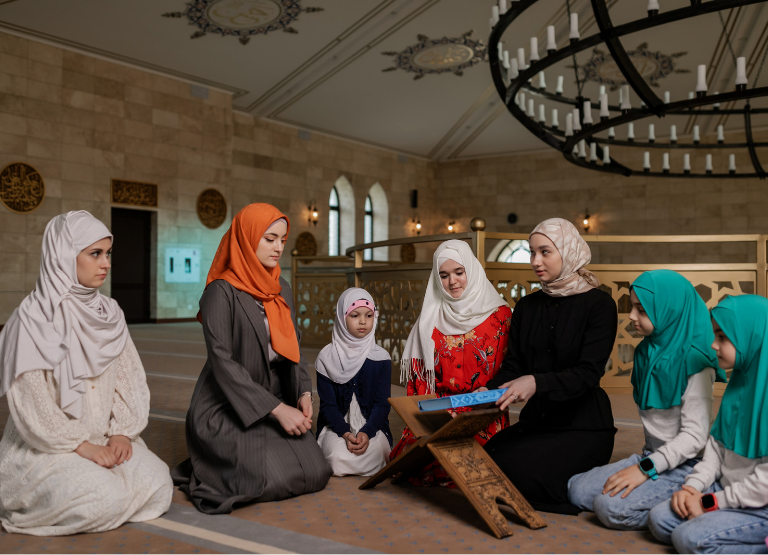Woman in Islam
Who are the women that Islam commanded to take care of them ❓
The Mother 🧕🏾:
A man once asked the Prophet ﷺ, “ To whom should I show kindness most?”
“ Your mother ” he replied.
The man said, “Then who?”
The Prophet [again] said,
“ Your mother .”
The man further asked, “Then who?” The Prophet replied, “ Your mother .”
The man asked again, “Then who?” The Prophet ﷺ said, “ Then your father .”
The Daughter 👧:
Allah’s Messenger ﷺ said, “ Whoever has three daughters and he remains patient with them, provides for them and clothes them from his money, they will be a shield for him from the Hellfire on the Day of Resurrection.
The Wife 🧕:
Allah’s Messenger ﷺ said, “ The best among you are those who are best to their wives, and I am the best amongst you to my wives.”
Islam pays great attention to the woman and looks upon her with honor and pride.
The woman in Islam is the mother, sister, daughter, aunt, aunt, grandmother and wife, the man’s partner in bearing the responsibilities of life. oneWith the man in honor and reverence.
Muslims believe that Islam gave women their rights after they suffered in the pre-Islamic era of their loss, the most important of which is the right to life.
Muslim scholars largely agree that at the beginning of Islam and specifically in the early sixth century CE, the Prophet Muhammad ﷺ extended the rights of women to include the right to inherit, own property, marry, alimony, and other rights. The Prophet Muhammad also forbade abusing women and commanded them to be treated kindly and compassionately, so he said in the Farewell Pilgrimage: “Treat women well, for they are with you helpers who do not have anything for themselves, and you only took them with the trust of God and sought permission from their private parts with the words of God, so be mindful of my words, O people.” And in Sahih al-Tirmidhi [1], the Prophet Muhammad ﷺ says: “The most perfect believers in faith are those who have the best manners, and your choice is the best for their women.”2 [3] [4] The Prophet Muhammad, peace be upon him, also says: (Oh God, I am embarrassing the rights of the two weak, the orphan and the woman), that is, treat them with kindness and compassion, and do not burden them with what they cannot bear, and do not neglect their duty. [5]
History also mentions that the Prophet Muhammad ﷺ, a few days before his death, went out to the people and was seriously ill, and delivered his last sermon to them, and among what he said and recommended: “O people, God is God in prayer, God is God in prayer.” Meaning, I swear by God Almighty that you preserve prayer, and he kept repeating it until he said: “O people, fear God regarding women, fear God regarding women, I advise you to be good towards women.”[6]
Islamic law took into account the differences between male and female, and based on these physical and psychological differences, Islam established the frameworks that govern the relationship of women to men and vice versa, and defined the rights and duties of each of them towards the other. Because of these differences, the man has become responsible for the care and protection of the woman and the provision of a decent living for her, which is what is called in Islam the guardianship.[7] Islam also emphasized the equal rights of men and women long ago. إذ جاء في سورة الحجرات: يَا أَيُّهَا النَّاسُ إِنَّا خَلَقْنَاكُمْ مِنْ ذَكَرٍ وَأُنْثَى وَجَعَلْنَاكُمْ شُعُوبًا وَقَبَائِلَ لِتَعَارَفُوا إِنَّ أَكْرَمَكُمْ عِنْدَ اللَّهِ أَتْقَاكُمْ إِنَّ اللَّهَ عَلِيمٌ خَبِيرٌ وفي هذه الآية يُبين القرآن أن لا فضل للذكر على الأنثى أو العكس إلا بالتقوىand good work.
It is noteworthy that the historic declaration adopted by the United Nations General Assembly regarding women and human rights, which states: (All people are born free and equal in dignity and rights) was approved on November 10, 1948, which means that Islam has preceded many contemporary global legislation on the subject Gender equality includingnot less than 1000 years.]8]
Concerns are often raised about the status of women in Islamic law. Misrepresentations, misconceptions and even weak hadiths about how women are treated by Sharia, are often used to stir public opinion and human rights and women’s rights associations to advance the idea that Islam is anti-women. British women’s rights activist writer Annie Besant says: “There is a lot more misunderstanding of Islam than there is (I think) in other religions in the world. There are many things said about it by those who do not belong to this faith.”[9], and the French social psychologist Gustave Le Bon says in his book The Civilization of the Arabs: [10] “The virtue of Islam was not limited to raising the status of women, but we add to this that it was the first religion to do so.
Islam encourages women to be educated and does not stand as an obstacle to obtaining the highest academic degrees and investing this knowledge in the benefit of people in their religion and their worldly affairs. Many believing women were famous for their knowledge during the era of the Prophet Muhammad, peace be upon him, and beyond. Among them, there were interpreters, jurists, poetry narrators, news and genealogical scholars. Women also contributedIn transmitting the legal rulings through the chain of transmission, especially with regard to the rulings of women (such as purification) and homes that men were not aware of, and most of the Companions and Caliphs used to refer to the mothers of the believers – especially Aisha – to ask them about the hidden rulings of the Sharia45]
Imam Ibn Hazm says in his book (Al-Ahkam):[46]Women in Islam and it is obligatory for them all to know the rulings of purity, prayer and fasting, and what is permissible and what is forbidden of food, drink, clothes and other things like men and there is no difference. Quoted from them the provisions of the religion of women inIslam
History mentions that women in the era of the Prophet Muhammad, peace be upon him, were learning matters of jurisprudence and the rulings of Sharia, and the Prophet Muhammad asked about them and he answered, as hadith books mention that the Prophet Muhammad, peace be upon him, had designated a day for women in which they worked on the provisions of religion and Sharia, the hadith says: “On the authority of Abu Saeed Al-Khudri – may God be pleased May God be pleased with him – that a woman came to the Messenger of God, may God bless him and grant him peaceThe Prophet, peace and blessings be upon him, and she said: The men have gone with your speech, so make a day for us, and we will come to you when you teach us what God has taught youHe set aside a day for them to teach them.”[47]
Aisha, the wife of the Prophet Muhammad, may God bless him and grant him peace, was one of the most knowledgeable women and reached a great stature in the era of the Prophet, may God bless him and grant him peace. Aisha is also one of the six who are the most knowledgeable of the Companions, and she was one of the most knowledgeable people in the Qur’an, the statutes, poetry and the days of the Arabs (history). Hisham bin Urwa said, narrating on the authority of his father: “I have not seen anyone more knowledgeable in jurisprudence, medicine, or poetry than Aisha.
(Umm al-Darda’) the scholarly jurist described by Imam al-Nawawi by saying, “They agreed to describe her with jurisprudence, reason and understanding.”[49]
Al-Shifa bint Abdullah, a Quraish immigrant who was good at writing and taught girls to read and write, and Omar Ibn Al-Khattab appointed her as the governor of the Hisbah district.
Hafsa bint Omar bin Al-Khattab was a student of Al-Shifa bint Abdullah before her marriage to the Prophet Muhammad, peace be upon him.
Amra bint Abd al-Rahman bin Asaad was a jurist of her time. Al-Zuhri narrated from her as narrated by Abdullah bin Abi Bakr, Yahya bin Saeed Al-Ansari and others, and bin Saad described her as a scholar, and she and her sisters were in Aisha’s stone and in her care.[48]
Sakina bint Al-Hussein, the scholarly jurist, about whom Al-Isfahani says: She used to sit with the future women of the Quraysh and the poets would gather for her.[48]
Fatima bint Al-Hussein bin Ali, the venerable scholar. She was one of the most intelligent and knowledgeable women of her time, and both Ibn Ishaq and Ibn Hisham relied on her narration to write down the Prophet’s biography.[48]
Shahda bint Ahmed bin Al-Faraj, who was nicknamed Fakhr Al-Nisa, said about her by Ibn Khalkan: “She was a witness of the scholars, she wrote good handwriting, many people heard her, and she had a high level of hearing.
Nafisa bint Al-Hassan bin Zaid bin Al-Hassan bin Ali was nicknamed Nafisa Al-Ilm. She used to attend the Majlis of Imam Malik bin Anas in Madinah. She was famous for her knowledge and righteousness. After moving to Egypt, she set up a scientific assembly attended by the most famous scholars of that era. of her pupils. Ibn Khalkan mentioned that Imam al-Shafi’i used to attend the knowledge gatherings of Mrs. Nafisa and was proud that he had received knowledge from her hand, and he did not stop visiting her and increasing her knowledge until God passed away, and she was one of his mourners.[48]
Fatima bint Abbas Al-Baghdadi was one of the people of jurisprudence and science, and she used to attend the councils of Sheikh Al-Islam Ibn Taymiyyah.[48]
Umm Habiba Al-Asbahaniah was one of the sheikhs of Al-Hafiz Al-Mundhiri, who mentioned that he obtained a leave of absence from her.
Fatima bint Muhammad al-Samarqandi was a great jurist, and she would correct her husband, Sheikh Alaa al-Din al-Kasani, author of the book (Bada’i al-Sana’i fi Tartib al-Shari’) his mistake in jurisprudence if he erred.
Examples of forms of respect Islam shows to women include the following:
Since men and women both came from the same essence, they are equal in their humanity.
Women are encouraged in Islam to contribute their opinions and ideas.
A Muslim woman has full right to approve or deny a proposal of marriage, and her name is to be kept after marriage.
A Muslim woman’s testimony is valid in legal disputes.
Islam grants them the right to inheritance*, allocating them equitable shares with men, While men support the family as a matter of religious obligation, women are not obliged to spend a penny
It stresses the importance of helping weak women who are in need of support, even if they are not one’s relatives.


